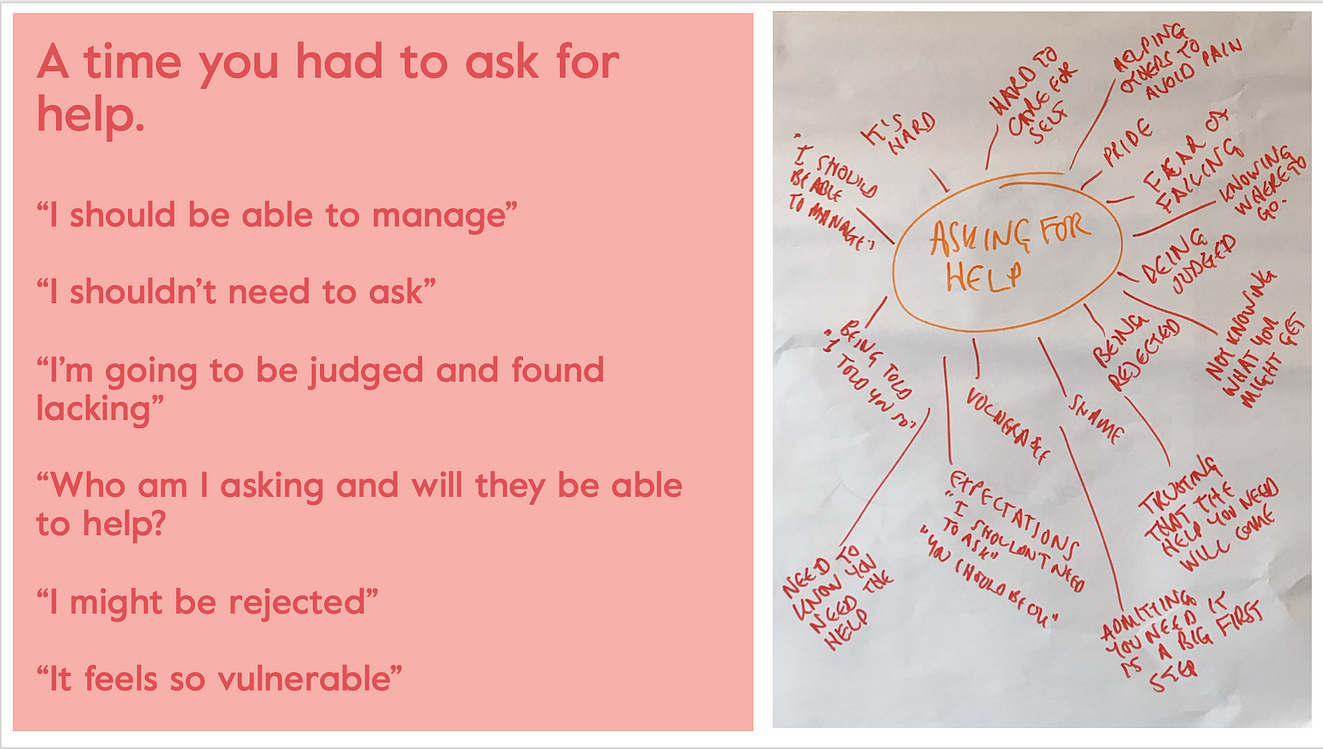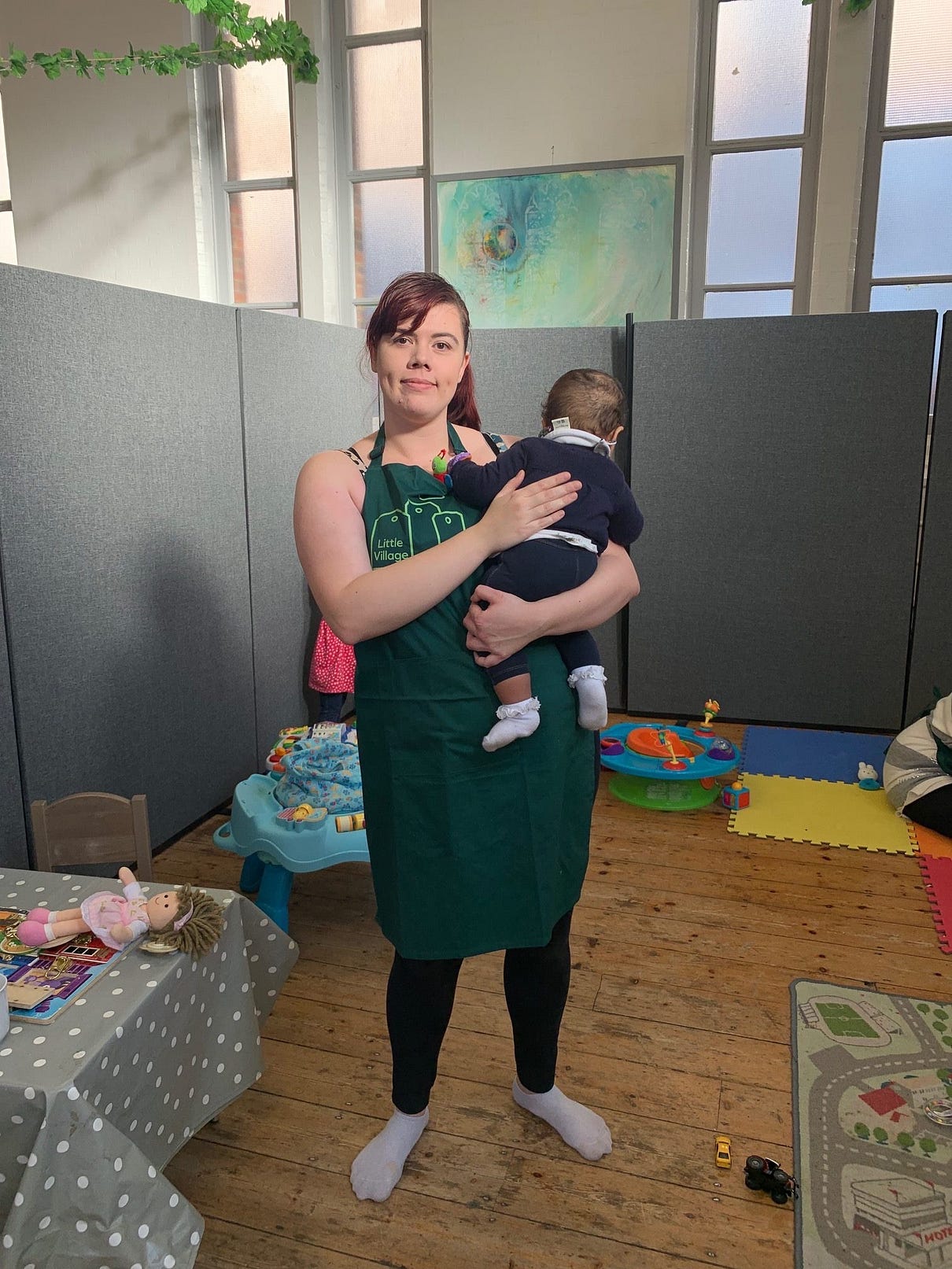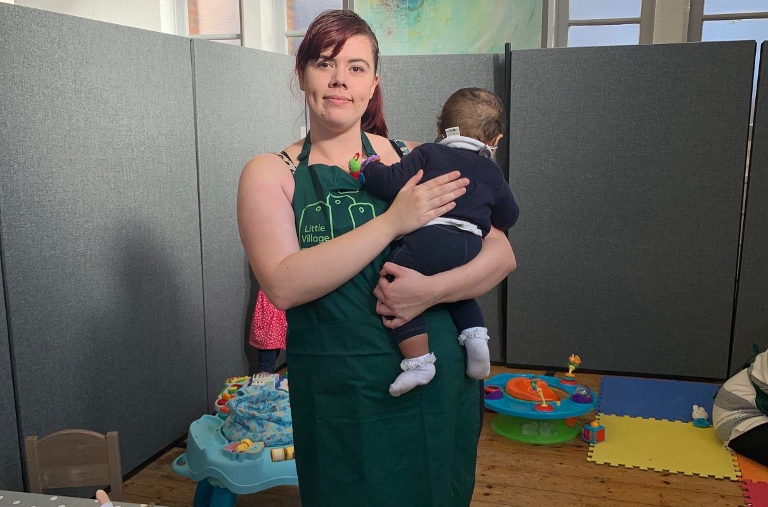“We need to reclaim the concept of love, not as an abstract, all embracing, fantasy but as a set of ethics, principles, values and behaviours. A love that is justice in action… To begin by always thinking of love as an action rather than a feeling is one way in which anyone using the word in this manner automatically assumes accountability and responsibility…Culturally all spheres of life — politics, religion, the workplace, domestic households, intimate relations — should and could have their foundation in a love ethic.” — bell hooks
I’ve been talking for a while about love as a driving force for our work at Little Village and today I shared some of my ideas, along with Charlie Leadbeater, with the team at the Paul Hamlyn Foundation. Paul Hamlyn were in fact one of the earliest supporters of Little Village in 2016, when I fondly referred to it as my ‘evening project’. The Ideas and Pioneers grant they gave me covered nine months’ worth of part-time childcare, which enabled me to get the work off the ground.
During those nine months we changed our name from ‘Tooting Baby Bank’ to Little Village. This was a very important change. It underlined the fact that as well as redistibuting pre-loved kit to families in need, we also had some serious intentions to build community. Villages are there to provide resilience and solidarity to their residents. I wanted Little Village to be an enabling infrastructure that supported the development of small, warm communities of parents helping each other in this global city.
That word, ‘help’. It’s at the heart of what we do, and it is not straightforward. Pause for a moment and think about a time you needed to ask for help, about something you really cared about. What was the situation? What emotions came up for you? What does it feel like to think about that now?

The emotions that surround the act of asking for help
The picture here shows some of the emotions people describe in the training sessions where we ask this question. These are universal feelings — it makes no difference who you are or where you come from: asking for help can be daunting, belittling and very, very difficult.
The warrior and the lover
And so it is no surprise that the families who turn up asking for help from Little Village bring with them pride, vulnerability, shame, and a sense of failure. People often arrive at our doors exhausted, anxious and defensive. They are in fight mode: they are used to battling the system, dealing with daily prejudice, and being let down by others. We hear time and again how ‘the system’ — benefits, housing, asylum officials — meet that fight with more fight. Interactions with the state and the associated language is denuded of all humanity — people are sanctioned, they are dispersed, they are asked to stand behind lines or share personal details with an official behind a glass wall.
At Little Village, in contrast, we meet that fight with love. We try to convey this in every possible way — from the greeting people get upon arrival, to the interactions with the volunteers, to the gifts we include for the parents in our bundles, to the quality and presentation of the items we are passing on.
The love in our work is reflected in behaviours and mindsets as well as these more tangible touchpoints. We teach our volunteers about two of Jung’s classic archetypes, the warrier and the lover. First, try standing as the warrior: put your hands on your hips, clench your jaw, and look to the distance, poised and ready for the battle. Really connect with what it feels to be in this position. Next, shift your position to that of the lover: relax your jaw, stand tall, and hold your hands out in front of you, palms turned upwards and fists unclenched. Notice the contrast and what becomes possible in this second position.
We train our volunteers to stand as the lover. It is incredible to see people’s shoulders drop as they realise they don’t need to fight. It is moving to see the conversation and trust emerge as people — volunteers and families we’re supporting alike — realise that they are just talking to another parent who sitting opposite them, sharing stories about kids that won’t sleep, or swapping tips about how to distract them when they’re grumpy.
A cup of tea as a radical act of social justice
Standing as the lover doesn’t mean our volunteers spend all day adopting weird poses and talking about psychoanalytic theory. It does mean, however, that they make a lot of cups of tea, including one for Amy, the extraordinary young woman you see here:

This is Amy.
Amy, who now co-leads our creche on Tuesday mornings so that others can volunteer, first arrived at Little Village two years ago. She had a baby under one arm, and a bag under another, and she’d escaped a violent, frightening home to build a new life. She says,
That first day I came to Little Village was the first time anyone had ever made me a cup of tea. It makes me emotional now to think about it. I was so used to being the one who did everything for everyone else.
What one of our brilliant volunteers did that day, through making the tea, and through connecting with Amy as a human being and a mother, was to convey three things: we see you; we hear your request for help; and we care for you. In a world where language and behaviours are designed to reinforce professionalism, and keep people and their needs at a safe distance, the act of making tea feels like a quiet, non-violent but nevertheless radical protest against the dehumanising structures that grind people further into poverty and isolation.
By meeting fight with love, we are inviting our volunteers and visiting families alike to find connection, to walk towards one another. And with connection comes empathy. And with empathy comes soldiarity and compassion — the commitment to stand shoulder to shoulder with one another, united in a belief that every parent deserves the right to give their child the best possible start in life.
Love as a route to social justice
We put a huge amount of work into building our culture at Little Village, running regular training sessions, as well as reflection sessions that are run by a psychotherapist. The language we use is of gifts, not handouts; of we, not I; of humanity and warmth, not rationality and judgement. We teach our volunteers and team about the difference between sympathy and empathy and we ask them to resist the urge to ‘fix’ others. We invite them to reflect on their own triggers and prejudices, and to recognise their privilege where they have it.
It is a constant battle to push back against the divisive narratives and policy discourses that are so present in 2019. This kind of deep work takes time, but I am ok with that because I see the difference it makes. I see how asking volunteers to act from a place of love is changing the way people treat each other. Nearly every piece of feedback we get from visiting families is about how they were made to feel, not the items that they took home:
Here a big thank you to all your staff. I said something deep and from the bottom of my heart which was: this place is the most beautiful impression I have ever seen in UK. It is the most human of kind. —Parent we supported
While the power of love to shape the lifechances of children is well evidenced, much less is understood about the power of love to create a forcefield for wider social change. My hunch is that love as I describe it here — an action, rather than a feeling — is a tool to build a much larger movement of people united in a shared desire to end child poverty.
Through the power of connection, empathy and care, people are emotionally engaged in the experience of family poverty. They are motivated to play a part in tackling its existence in a way they might not otherwise be. This might not be the traditional activism of marching, signing petitions or striking. But the act of making a small change in the world through your relationship with another human being seems to ignite something else, a desire to be part of a bigger system change — in our case to be part of a the work needed to tackle child poverty so organisations like ours aren’t needed in the first place.
Love in its essence is spiritual fire — Seneca
Here at Little Village I feel like we’re in the foothills of discovery on this stuff. But I’m buoyed by the fact there’s a rich history of discourse, from bell hooks’ electric writing to Gandhi’s deep thinking about what he called the ‘love-force’ of non-violent action and peaceful protest in the pursuit of justice. For these amazing people, and others like Nelson Mandela and Martin Luther King, love in action means taking on deeply embedded power structures, and seeking change in them to achieve equality and justice, but doing this through peaceful means of engagement and empathy, not force or war.
And there’s plenty of inspiration around us right now too. Graham Leicester, Hilary Cottam, Charlie Leadbeater and Jennie Winhall are all exploring these ideas. The work that Becca Dove and Tim Fisher are pioneering around ‘relational activism’ in Camden feels really exciting and I love their writing about it (see here and here). Family by Family, incubated by TACSI in Australia, offers a model of peer-based support built upon a foundation of love; Sophie Humphries and her work with Pause and her latest venture share a similar interest in how the relational dynamics contain the keys to wider system change. But where else should I be looking? I’d love your ideas and leads on this so please drop me a line if you’re interested in being part of future conversations.





